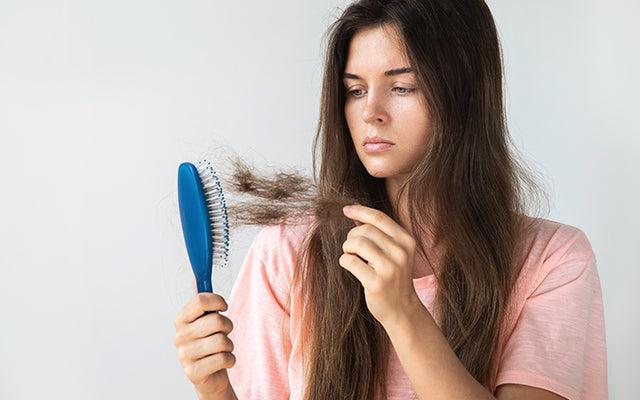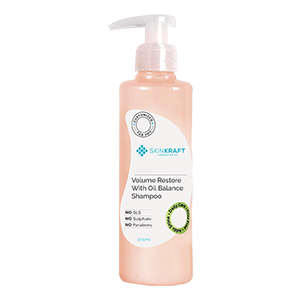Is the autoimmune disease of lupus causing you excessive hair loss? Well, lupus does have a major connection with hair loss. In fact, a few people going through lupus, experience inflammation on their scalp, which may lead to hair fall.
The good news is that there are ways to treat this hair fall. Read on to know how to manage and treat hair loss due to lupus.
Highlights:
What Is Lupus Hair Loss?
Lupus is a known long term autoimmune disease. Just like other autoimmune diseases, this also makes your immune system hyperactive. As a result, your own immune system attacks healthy body cells. [1]
People with lupus often experience joint pain, inflammation, damage to the kidney and lungs. Many develop skin problems, lesions and itchy rashes on the scalp. Hair starts thinning, and in many cases, leads to hair loss. Therefore, experts have termed this condition as lupus hair loss.
While hair loss is a prominent side effect of lupus, it can be an early symptom as well. If you are having extreme hair fall, it may be the first sign of this underlying disease. Hair loss in lupus, can be caused by any of the below-listed reasons.

1. Lesions
Skin lesions are abnormal growth around the skin that a person may get from birth. The primary reason for skin lesions can also be skin infections such as acne, scabies, boils, atopic dermatitis etc. Wart virus and herpes simplex virus are also responsible for skin lesions.
Autoimmune diseases like lupus can also cause skin lesions. Lesions may look like red pus-filled blisters or may be scaly skin patches that are extremely itchy. These lesions leave scars on your scalp and damage your hair follicles permanently. Since your hair follicles turn weak and vulnerable, you start losing hair. [2]
2. Skin Inflammation
Inflammation is the most common sign of lupus and can occur anywhere in the body. When the inflammation spreads to your face and scalp, hair follicles get affected and you start noticing hair fall. Hair fall due to inflammation does not stop at the scalp, as it affects eyebrows and eyelashes as well.
3. Lupus Medication
When diagnosed with lupus, it becomes essential to take medication to treat the condition. But the medication is very strong and works to suppress a hyperactive immune system. As a side effect of the strong medication, you may experience excessive hair fall.
What Causes Lupus?
1. Surrounding Environment
Lupus can be triggered by your surroundings. The weather condition in your area and the atmosphere you stay in matters a lot when it comes to your health. Dusty, dry and foggy areas are not good for your health and long term exposure to such an environment, may lead to lupus.
2. Abnormal Hormone Secretion
Studies show that many lupus patients have experienced an abnormal level of certain hormonal changes all of a sudden. Experts found that a high estrogen level in the body can trigger lupus.
3. Genetics
Just like many personality traits, having a family history of lupus puts you at a high risk of getting it. In fact, many cases of lupus are known to have been caused by genetic reasons, according to research.
4. Drug-Induced Lupus
Long term consumption of certain medications can also trigger lupus. Procainamide and hydralazine are two such medicines. Procainamide is prescribed for irregular heartbeats and hydralazine is prescribed to control high blood pressure. A few people developed lupus after long term consumption of these medicines. But it does not mean that you will surely get lupus if you take these medications. [3]
5. Infections
Researchers have studied to find out if infections are somehow connected to lupus. Two names that have come out in the findings include cytomegalovirus and Epstein-Barr. However, there is still no concrete evidence to prove the direct connection between these two infections and lupus. [4]
What Are The Symptoms Of Lupus[5]?
- Loss of appetite
- Weight loss
- Hair loss
- Headache
- Chest pain
- Difficulty in breathing
- Fatigue
- Skin inflammation
- Joint pains
- Sudden swelling in different parts of the body
- Swollen glands
- Itchy rashes
- Mouth ulcers
- Sun sensitivity
- High fever
- Arthritis
- Anaemia
- Blood clotting
- Vision problems
How To Treat Lupus Hair Loss?
1. Protect From Sunlight
Lupus makes your body sun-sensitive which can make your scalp even itchier and worsen the rashes. It is better to cover your head when you go under the scorching heat. It will not just protect you from sunlight but also spare you from constant contact with dirt and dust. Cleaner hair will make treatment easier.
2. Control Your Diet
Your food intake matters for your overall health. But when you are already going through a tough condition, your body needs more strength. Healthy and nutrient-filled food is your best option to take care of yourself. Add vitamins and proteins to your diet to benefit hair growth. Vitamin C and D, zinc, iron, and biotin intake can help you reduce hair loss.
3. Over The Counter Treatment
Certain over the counter medicines can help in treating lupus hair loss. However, be wary of misguided information from people as using random products may worsen your hair condition. We suggest you consult your doctor for proper medication if you are facing extreme hair fall.
4. Change Of Medication
If you are experiencing hair loss after taking the medication of lupus, then it is maybe a side effect of the medication. In this case, you may talk to your doctor to change the medication if possible. The doctor would understand your condition better and suggest something that will help you treat your lupus as well as reduce the hair loss.
5. Control Your Stress
Having an autoimmune disease is stressful. But this stress would not solve anything, rather it can double up your problems. Hair loss happens more when you are stressed out. Try to control your stress as much as possible. If possible try meditation to get some relief from stress.
6. Increase Your Resting Period
Resting your body and mind is equally important along with proper medication. Lupus can cause many complications. This coupled with your strong medication can be tough on both body and mind. To cope up with everything, it is a must that you get a minimum of eight to nine hours of rest every night.

Diet Tips For Lupus
1. Food You Need To Add To Your Diet
A. Omega 3 Rich Food:
Omega 3 rich food will help reduce the inflammation caused by lupus. Fish such as salmon, shrimp, mackerel are recommended for lupus patients. Walnuts, kidney beans, and seaweed also have a fair share of omega 3 in them.
B. High Calcium Food:
Dark leafy green vegetables, tofu, beans and dairy products contain a lot of calcium. Calcium intake is highly recommended for lupus patients as they may develop bone disorders.
C. Antioxidants:
Antioxidants help to reduce inflammation and prevent cell damage. Vitamin A, B and E are the best option for lupus treatment. Add fruits, vegetables, oats, and nuts to your meals. Also, green tea can be great if you are looking for antioxidants.
2. Foods You Need To Avoid
A. Garlic:
Garlic has allicin, ajoene, and thiosulfate that are great to boost the white blood cells to fight diseases. But in lupus, even a small amount of garlic can be harmful. In this condition, your hyperactive immune system will cause flare-ups.
B. Alfalfa Sprouts:
Alfalfa sprouts are rich in an amino acid called L-canavanine. It influences the immune system and makes it even more active which is not good for any lupus patient.
C. Echinacea:
It is a known ingredient found in supplement products to stimulate your immune system. If you are taking any supplements, make sure that they are free from echinacea.
How To Prevent Lupus Hair Loss?
1. Use mild and gentle hair care products if you have lupus and are facing excessive products.
2. Do not use hair styling products and tools as they can cause further damage.
3. Keep your hair and scalp moisturized, as dry hair tends to fall more.
4. Use a satin pillowcase for your pillow. It reduces hair friction and prevents breakage.
5. Choose a soft bristle hairbrush to comb your hair.
6. Don’t tie your hair too tightly. Make sure your bun or pony is letting your hair breathe.
Wrapping Up
Lupus hair loss may sound frightening, but with proper care and treatment, you will eventually feel better. Since hair loss is mostly a result of the inflammation caused by lupus, it can be reversed once your health starts improving. But hair loss due to lesions is usually permanent as they leave scars.
Don’t ignore the condition of lupus hair loss. Seek medical help. Use hair care products after consulting your doctor if you have lesions on your scalp. Follow the tips that we have mentioned above to lead a healthy life.
Recommended Products
Was this Article helpful?
- Least helpful
- Most helpful











